The Importance of Teamwork in the Workplace: An Essay Analysis
VerifiedAdded on 2023/02/01
|10
|1741
|89
Essay
AI Summary
This essay provides a comprehensive analysis of teamwork's importance within the workplace, beginning with a definition of a team and its significance to an organization. It delves into Tuckman's Model of Team Development, outlining the stages of forming, storming, norming, and performing, alongside the crucial role of leadership at each stage. The essay also identifies the characteristics of an effective team, such as clear direction, open communication, adaptability to risk and change, and defined roles. The essay concludes by emphasizing how good teamwork practices can lead to the smooth running and overall success of an organization. The content is supported by references to various academic sources.

THE IMPORTANCE OF
TEAMWORK IN THE
WORKPLACE
The Importance of Teamwork in the workplace 0
TEAMWORK IN THE
WORKPLACE
The Importance of Teamwork in the workplace 0
Paraphrase This Document
Need a fresh take? Get an instant paraphrase of this document with our AI Paraphraser
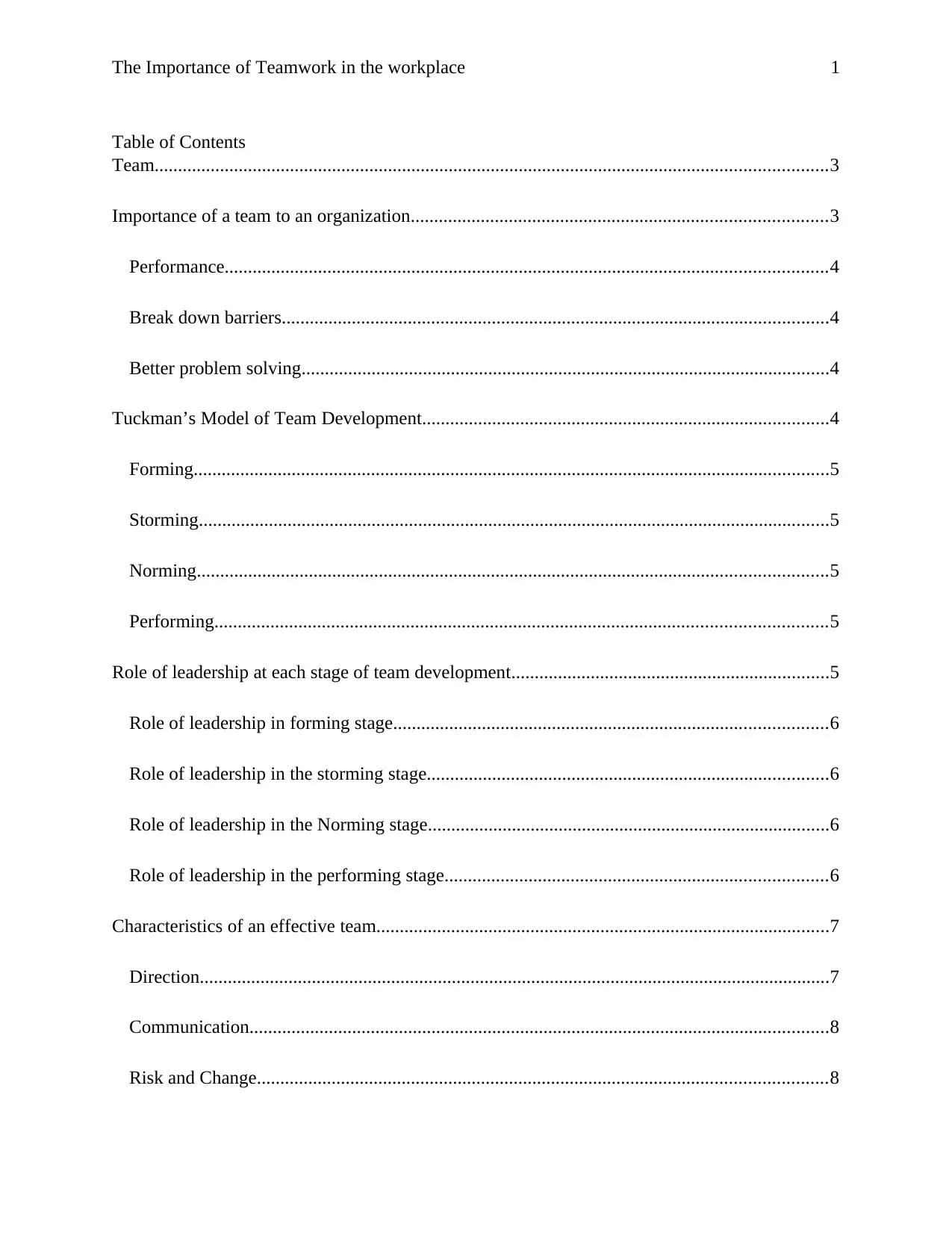
The Importance of Teamwork in the workplace 1
Table of Contents
Team................................................................................................................................................3
Importance of a team to an organization.........................................................................................3
Performance.................................................................................................................................4
Break down barriers.....................................................................................................................4
Better problem solving.................................................................................................................4
Tuckman’s Model of Team Development.......................................................................................4
Forming........................................................................................................................................5
Storming.......................................................................................................................................5
Norming.......................................................................................................................................5
Performing...................................................................................................................................5
Role of leadership at each stage of team development....................................................................5
Role of leadership in forming stage.............................................................................................6
Role of leadership in the storming stage......................................................................................6
Role of leadership in the Norming stage......................................................................................6
Role of leadership in the performing stage..................................................................................6
Characteristics of an effective team.................................................................................................7
Direction.......................................................................................................................................7
Communication............................................................................................................................8
Risk and Change..........................................................................................................................8
Table of Contents
Team................................................................................................................................................3
Importance of a team to an organization.........................................................................................3
Performance.................................................................................................................................4
Break down barriers.....................................................................................................................4
Better problem solving.................................................................................................................4
Tuckman’s Model of Team Development.......................................................................................4
Forming........................................................................................................................................5
Storming.......................................................................................................................................5
Norming.......................................................................................................................................5
Performing...................................................................................................................................5
Role of leadership at each stage of team development....................................................................5
Role of leadership in forming stage.............................................................................................6
Role of leadership in the storming stage......................................................................................6
Role of leadership in the Norming stage......................................................................................6
Role of leadership in the performing stage..................................................................................6
Characteristics of an effective team.................................................................................................7
Direction.......................................................................................................................................7
Communication............................................................................................................................8
Risk and Change..........................................................................................................................8

The Importance of Teamwork in the workplace 2
Roles.............................................................................................................................................8
Conclusion.......................................................................................................................................8
References........................................................................................................................................9
Roles.............................................................................................................................................8
Conclusion.......................................................................................................................................8
References........................................................................................................................................9
⊘ This is a preview!⊘
Do you want full access?
Subscribe today to unlock all pages.

Trusted by 1+ million students worldwide
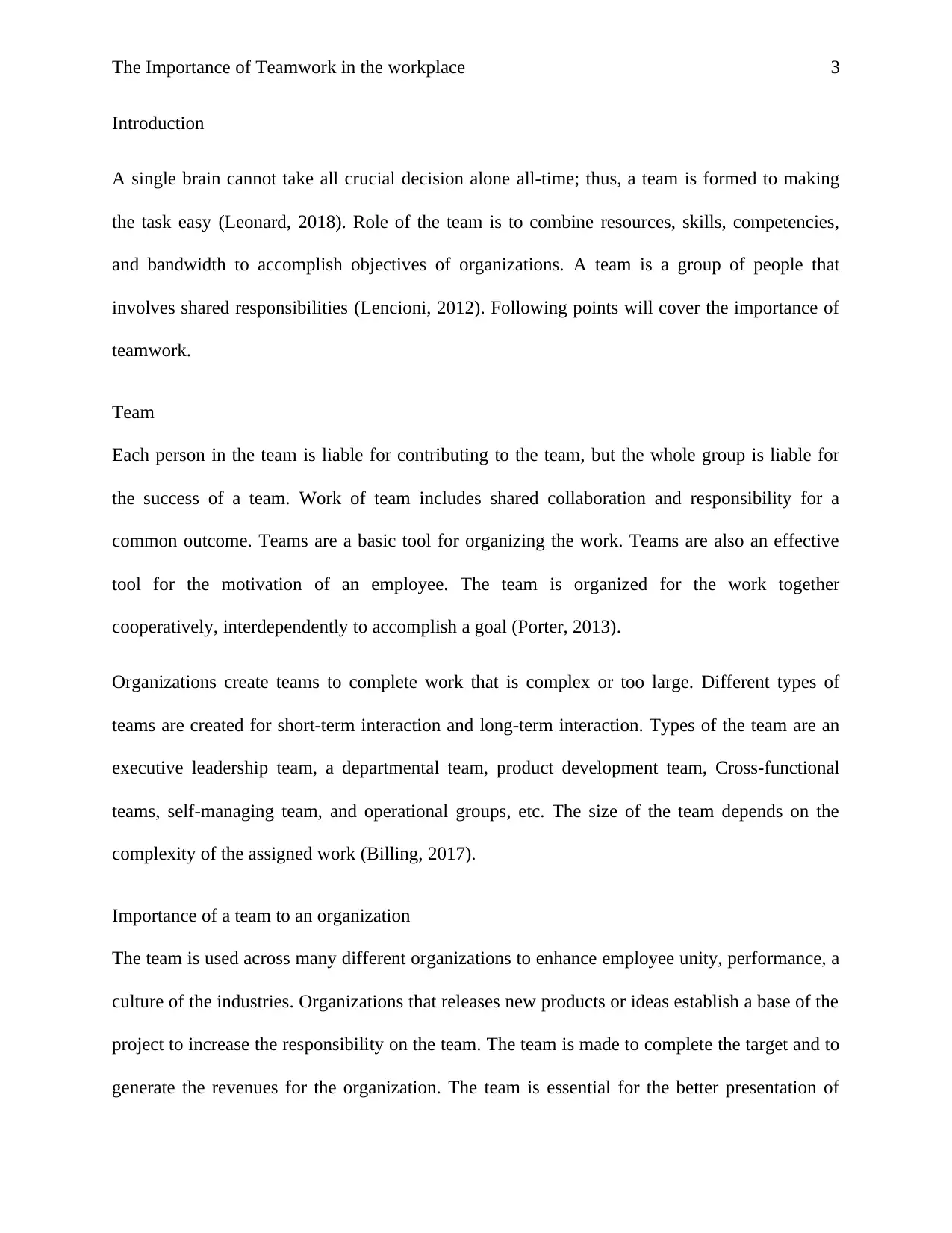
The Importance of Teamwork in the workplace 3
Introduction
A single brain cannot take all crucial decision alone all-time; thus, a team is formed to making
the task easy (Leonard, 2018). Role of the team is to combine resources, skills, competencies,
and bandwidth to accomplish objectives of organizations. A team is a group of people that
involves shared responsibilities (Lencioni, 2012). Following points will cover the importance of
teamwork.
Team
Each person in the team is liable for contributing to the team, but the whole group is liable for
the success of a team. Work of team includes shared collaboration and responsibility for a
common outcome. Teams are a basic tool for organizing the work. Teams are also an effective
tool for the motivation of an employee. The team is organized for the work together
cooperatively, interdependently to accomplish a goal (Porter, 2013).
Organizations create teams to complete work that is complex or too large. Different types of
teams are created for short-term interaction and long-term interaction. Types of the team are an
executive leadership team, a departmental team, product development team, Cross-functional
teams, self-managing team, and operational groups, etc. The size of the team depends on the
complexity of the assigned work (Billing, 2017).
Importance of a team to an organization
The team is used across many different organizations to enhance employee unity, performance, a
culture of the industries. Organizations that releases new products or ideas establish a base of the
project to increase the responsibility on the team. The team is made to complete the target and to
generate the revenues for the organization. The team is essential for the better presentation of
Introduction
A single brain cannot take all crucial decision alone all-time; thus, a team is formed to making
the task easy (Leonard, 2018). Role of the team is to combine resources, skills, competencies,
and bandwidth to accomplish objectives of organizations. A team is a group of people that
involves shared responsibilities (Lencioni, 2012). Following points will cover the importance of
teamwork.
Team
Each person in the team is liable for contributing to the team, but the whole group is liable for
the success of a team. Work of team includes shared collaboration and responsibility for a
common outcome. Teams are a basic tool for organizing the work. Teams are also an effective
tool for the motivation of an employee. The team is organized for the work together
cooperatively, interdependently to accomplish a goal (Porter, 2013).
Organizations create teams to complete work that is complex or too large. Different types of
teams are created for short-term interaction and long-term interaction. Types of the team are an
executive leadership team, a departmental team, product development team, Cross-functional
teams, self-managing team, and operational groups, etc. The size of the team depends on the
complexity of the assigned work (Billing, 2017).
Importance of a team to an organization
The team is used across many different organizations to enhance employee unity, performance, a
culture of the industries. Organizations that releases new products or ideas establish a base of the
project to increase the responsibility on the team. The team is made to complete the target and to
generate the revenues for the organization. The team is essential for the better presentation of
Paraphrase This Document
Need a fresh take? Get an instant paraphrase of this document with our AI Paraphraser
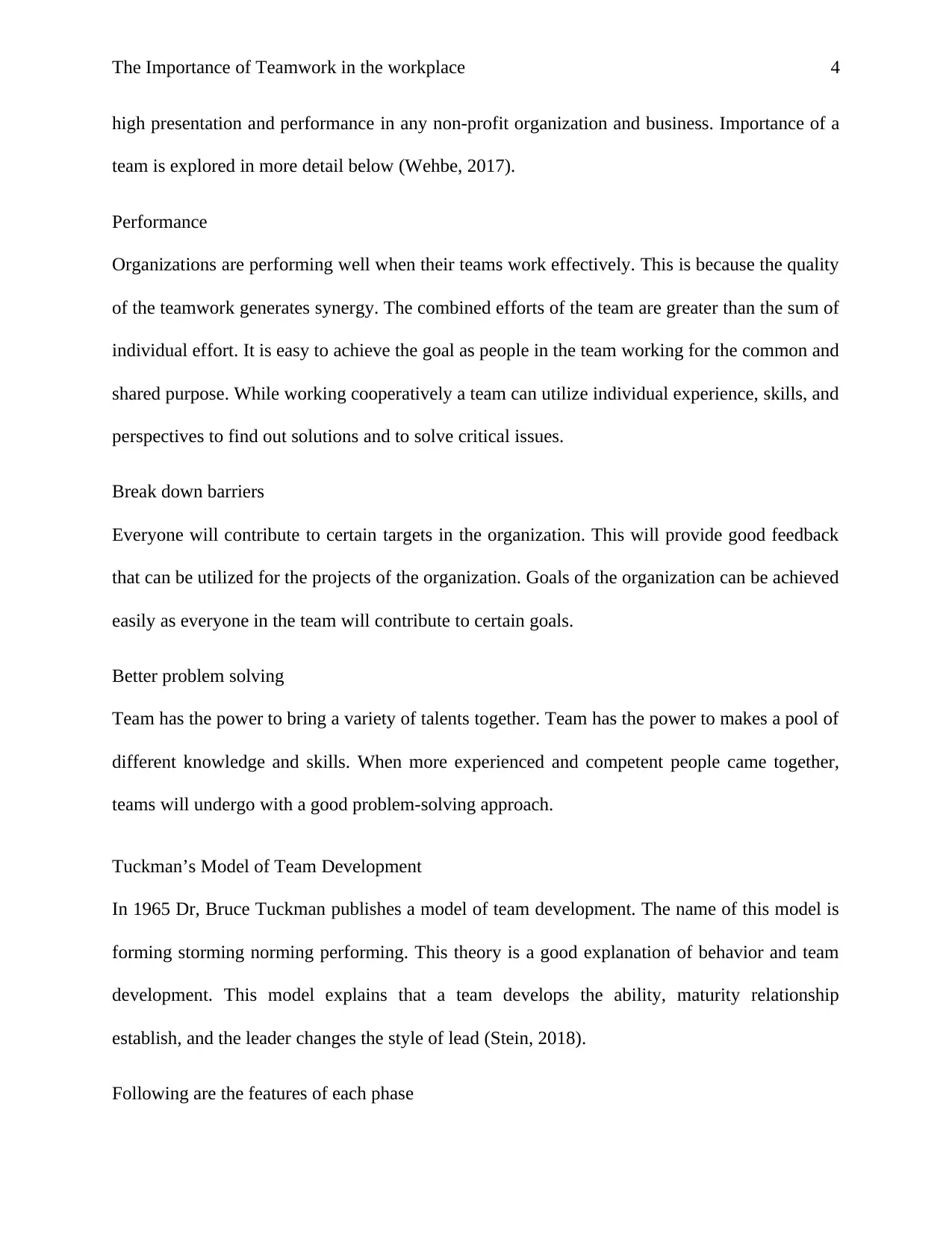
The Importance of Teamwork in the workplace 4
high presentation and performance in any non-profit organization and business. Importance of a
team is explored in more detail below (Wehbe, 2017).
Performance
Organizations are performing well when their teams work effectively. This is because the quality
of the teamwork generates synergy. The combined efforts of the team are greater than the sum of
individual effort. It is easy to achieve the goal as people in the team working for the common and
shared purpose. While working cooperatively a team can utilize individual experience, skills, and
perspectives to find out solutions and to solve critical issues.
Break down barriers
Everyone will contribute to certain targets in the organization. This will provide good feedback
that can be utilized for the projects of the organization. Goals of the organization can be achieved
easily as everyone in the team will contribute to certain goals.
Better problem solving
Team has the power to bring a variety of talents together. Team has the power to makes a pool of
different knowledge and skills. When more experienced and competent people came together,
teams will undergo with a good problem-solving approach.
Tuckman’s Model of Team Development
In 1965 Dr, Bruce Tuckman publishes a model of team development. The name of this model is
forming storming norming performing. This theory is a good explanation of behavior and team
development. This model explains that a team develops the ability, maturity relationship
establish, and the leader changes the style of lead (Stein, 2018).
Following are the features of each phase
high presentation and performance in any non-profit organization and business. Importance of a
team is explored in more detail below (Wehbe, 2017).
Performance
Organizations are performing well when their teams work effectively. This is because the quality
of the teamwork generates synergy. The combined efforts of the team are greater than the sum of
individual effort. It is easy to achieve the goal as people in the team working for the common and
shared purpose. While working cooperatively a team can utilize individual experience, skills, and
perspectives to find out solutions and to solve critical issues.
Break down barriers
Everyone will contribute to certain targets in the organization. This will provide good feedback
that can be utilized for the projects of the organization. Goals of the organization can be achieved
easily as everyone in the team will contribute to certain goals.
Better problem solving
Team has the power to bring a variety of talents together. Team has the power to makes a pool of
different knowledge and skills. When more experienced and competent people came together,
teams will undergo with a good problem-solving approach.
Tuckman’s Model of Team Development
In 1965 Dr, Bruce Tuckman publishes a model of team development. The name of this model is
forming storming norming performing. This theory is a good explanation of behavior and team
development. This model explains that a team develops the ability, maturity relationship
establish, and the leader changes the style of lead (Stein, 2018).
Following are the features of each phase
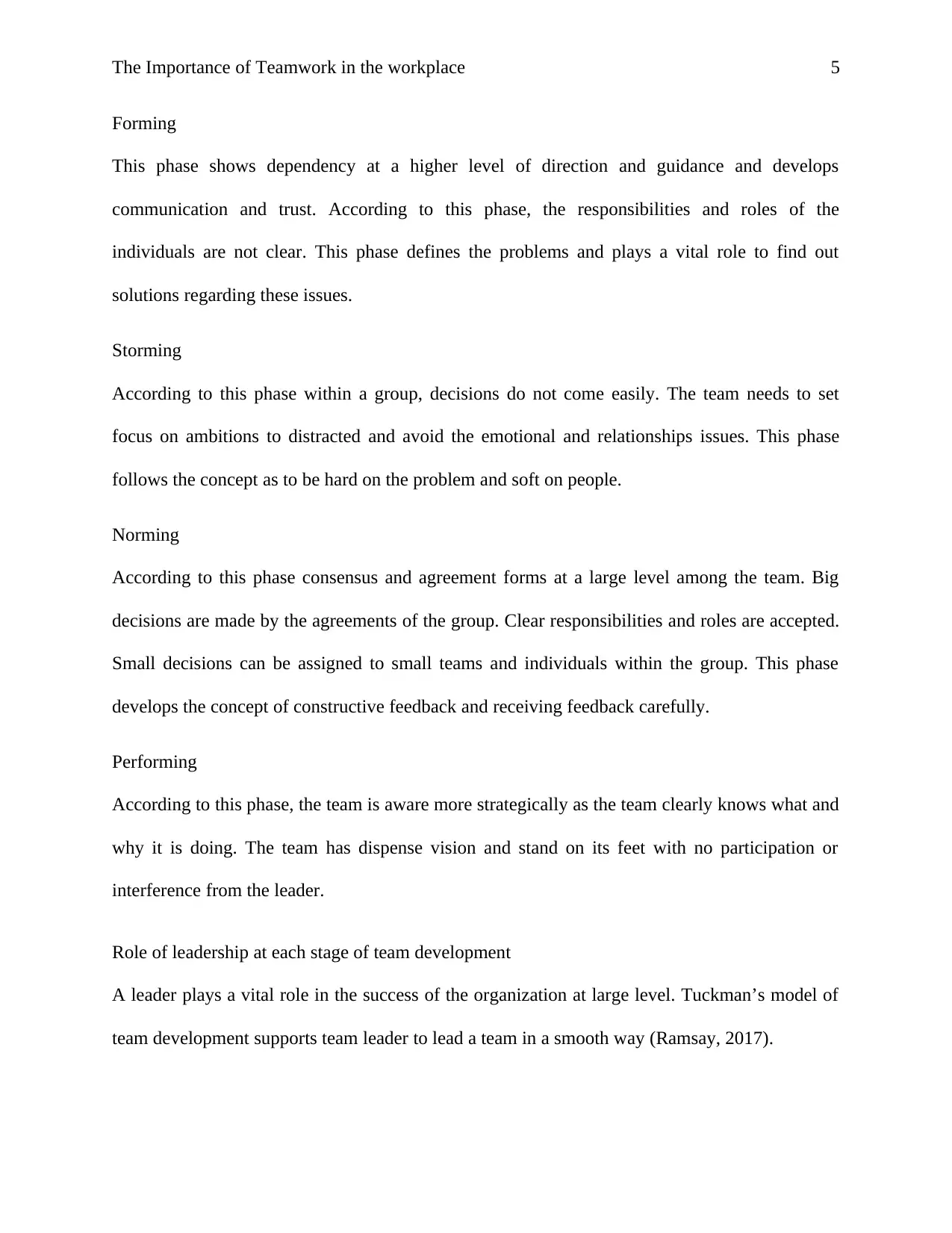
The Importance of Teamwork in the workplace 5
Forming
This phase shows dependency at a higher level of direction and guidance and develops
communication and trust. According to this phase, the responsibilities and roles of the
individuals are not clear. This phase defines the problems and plays a vital role to find out
solutions regarding these issues.
Storming
According to this phase within a group, decisions do not come easily. The team needs to set
focus on ambitions to distracted and avoid the emotional and relationships issues. This phase
follows the concept as to be hard on the problem and soft on people.
Norming
According to this phase consensus and agreement forms at a large level among the team. Big
decisions are made by the agreements of the group. Clear responsibilities and roles are accepted.
Small decisions can be assigned to small teams and individuals within the group. This phase
develops the concept of constructive feedback and receiving feedback carefully.
Performing
According to this phase, the team is aware more strategically as the team clearly knows what and
why it is doing. The team has dispense vision and stand on its feet with no participation or
interference from the leader.
Role of leadership at each stage of team development
A leader plays a vital role in the success of the organization at large level. Tuckman’s model of
team development supports team leader to lead a team in a smooth way (Ramsay, 2017).
Forming
This phase shows dependency at a higher level of direction and guidance and develops
communication and trust. According to this phase, the responsibilities and roles of the
individuals are not clear. This phase defines the problems and plays a vital role to find out
solutions regarding these issues.
Storming
According to this phase within a group, decisions do not come easily. The team needs to set
focus on ambitions to distracted and avoid the emotional and relationships issues. This phase
follows the concept as to be hard on the problem and soft on people.
Norming
According to this phase consensus and agreement forms at a large level among the team. Big
decisions are made by the agreements of the group. Clear responsibilities and roles are accepted.
Small decisions can be assigned to small teams and individuals within the group. This phase
develops the concept of constructive feedback and receiving feedback carefully.
Performing
According to this phase, the team is aware more strategically as the team clearly knows what and
why it is doing. The team has dispense vision and stand on its feet with no participation or
interference from the leader.
Role of leadership at each stage of team development
A leader plays a vital role in the success of the organization at large level. Tuckman’s model of
team development supports team leader to lead a team in a smooth way (Ramsay, 2017).
⊘ This is a preview!⊘
Do you want full access?
Subscribe today to unlock all pages.

Trusted by 1+ million students worldwide
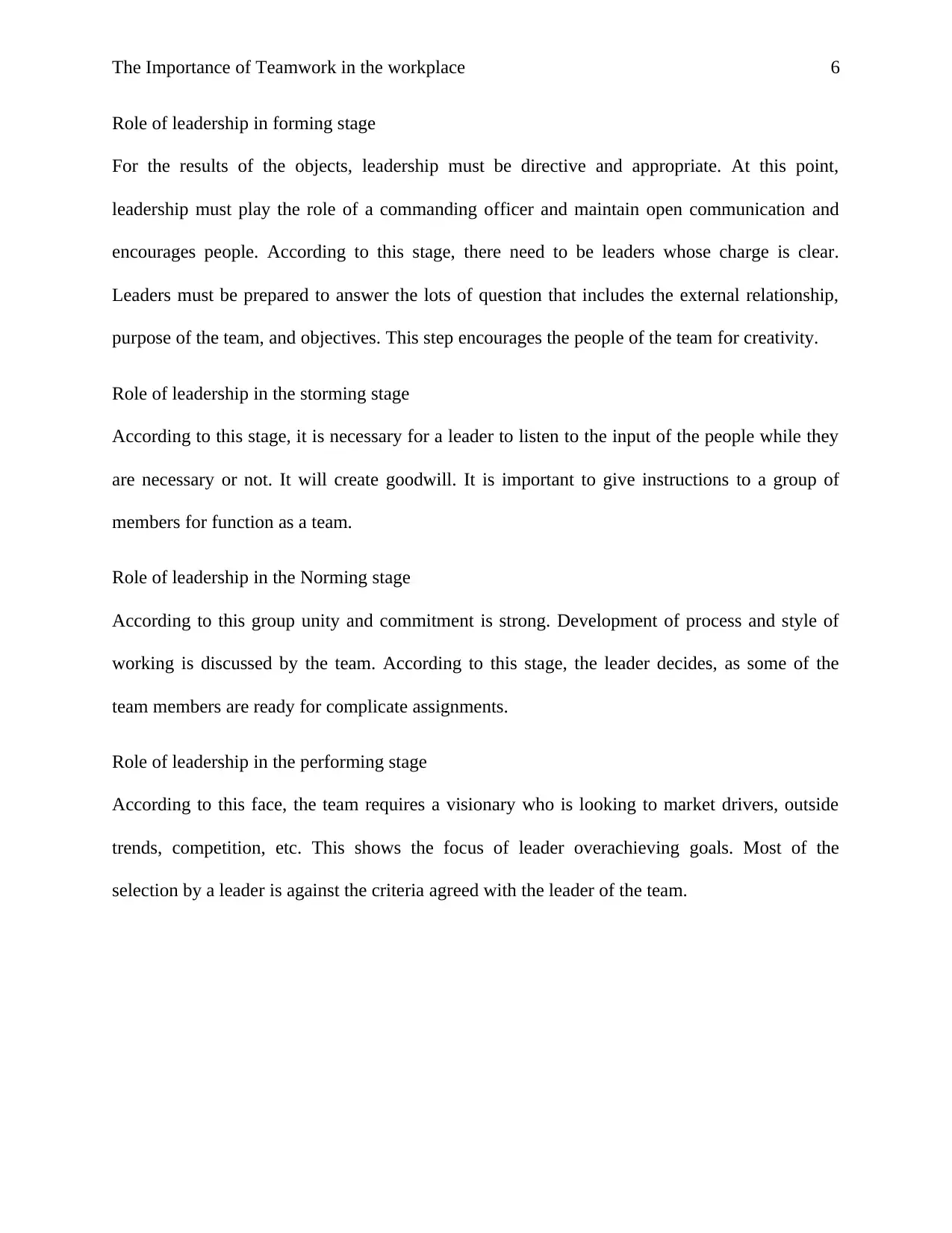
The Importance of Teamwork in the workplace 6
Role of leadership in forming stage
For the results of the objects, leadership must be directive and appropriate. At this point,
leadership must play the role of a commanding officer and maintain open communication and
encourages people. According to this stage, there need to be leaders whose charge is clear.
Leaders must be prepared to answer the lots of question that includes the external relationship,
purpose of the team, and objectives. This step encourages the people of the team for creativity.
Role of leadership in the storming stage
According to this stage, it is necessary for a leader to listen to the input of the people while they
are necessary or not. It will create goodwill. It is important to give instructions to a group of
members for function as a team.
Role of leadership in the Norming stage
According to this group unity and commitment is strong. Development of process and style of
working is discussed by the team. According to this stage, the leader decides, as some of the
team members are ready for complicate assignments.
Role of leadership in the performing stage
According to this face, the team requires a visionary who is looking to market drivers, outside
trends, competition, etc. This shows the focus of leader overachieving goals. Most of the
selection by a leader is against the criteria agreed with the leader of the team.
Role of leadership in forming stage
For the results of the objects, leadership must be directive and appropriate. At this point,
leadership must play the role of a commanding officer and maintain open communication and
encourages people. According to this stage, there need to be leaders whose charge is clear.
Leaders must be prepared to answer the lots of question that includes the external relationship,
purpose of the team, and objectives. This step encourages the people of the team for creativity.
Role of leadership in the storming stage
According to this stage, it is necessary for a leader to listen to the input of the people while they
are necessary or not. It will create goodwill. It is important to give instructions to a group of
members for function as a team.
Role of leadership in the Norming stage
According to this group unity and commitment is strong. Development of process and style of
working is discussed by the team. According to this stage, the leader decides, as some of the
team members are ready for complicate assignments.
Role of leadership in the performing stage
According to this face, the team requires a visionary who is looking to market drivers, outside
trends, competition, etc. This shows the focus of leader overachieving goals. Most of the
selection by a leader is against the criteria agreed with the leader of the team.
Paraphrase This Document
Need a fresh take? Get an instant paraphrase of this document with our AI Paraphraser
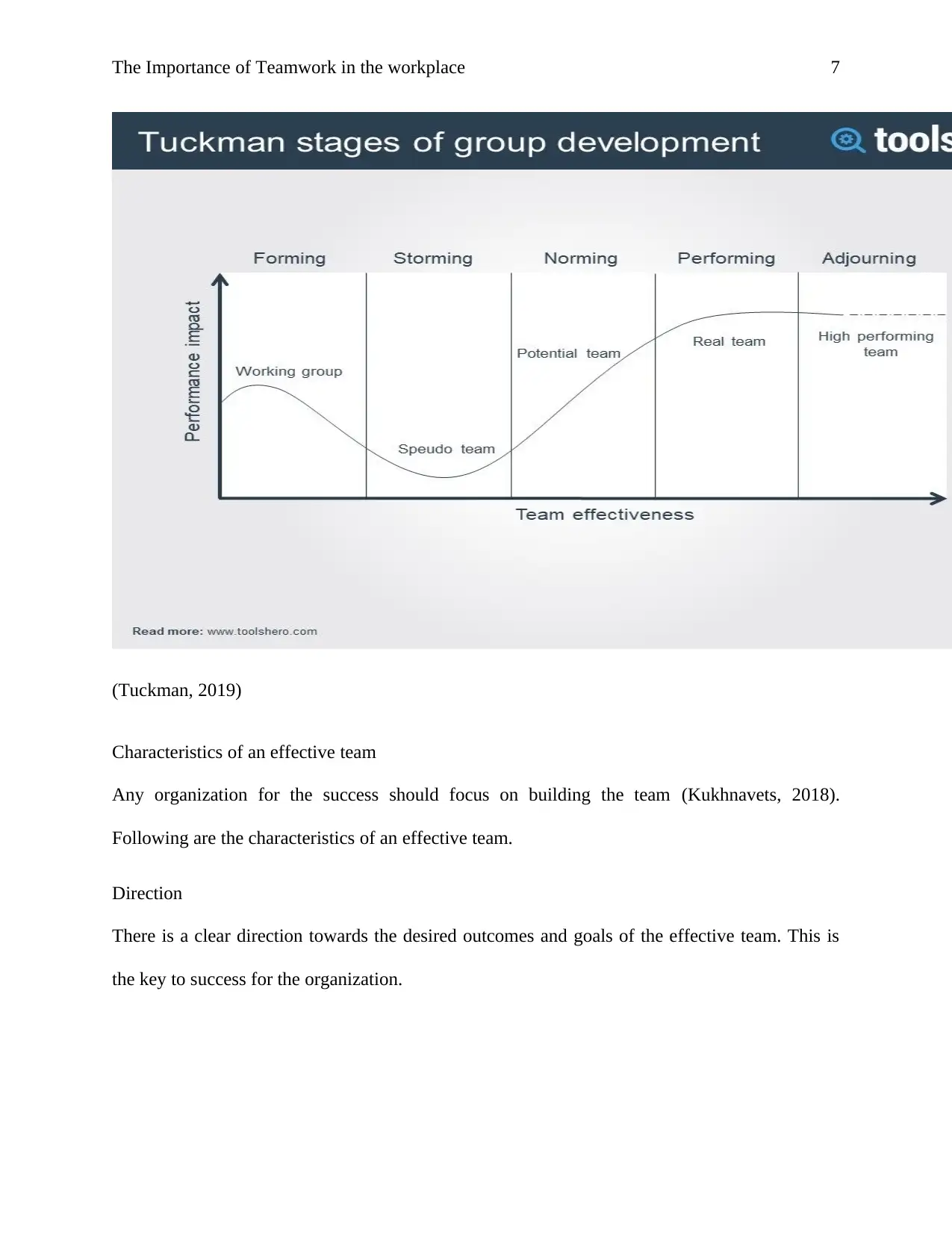
The Importance of Teamwork in the workplace 7
(Tuckman, 2019)
Characteristics of an effective team
Any organization for the success should focus on building the team (Kukhnavets, 2018).
Following are the characteristics of an effective team.
Direction
There is a clear direction towards the desired outcomes and goals of the effective team. This is
the key to success for the organization.
(Tuckman, 2019)
Characteristics of an effective team
Any organization for the success should focus on building the team (Kukhnavets, 2018).
Following are the characteristics of an effective team.
Direction
There is a clear direction towards the desired outcomes and goals of the effective team. This is
the key to success for the organization.
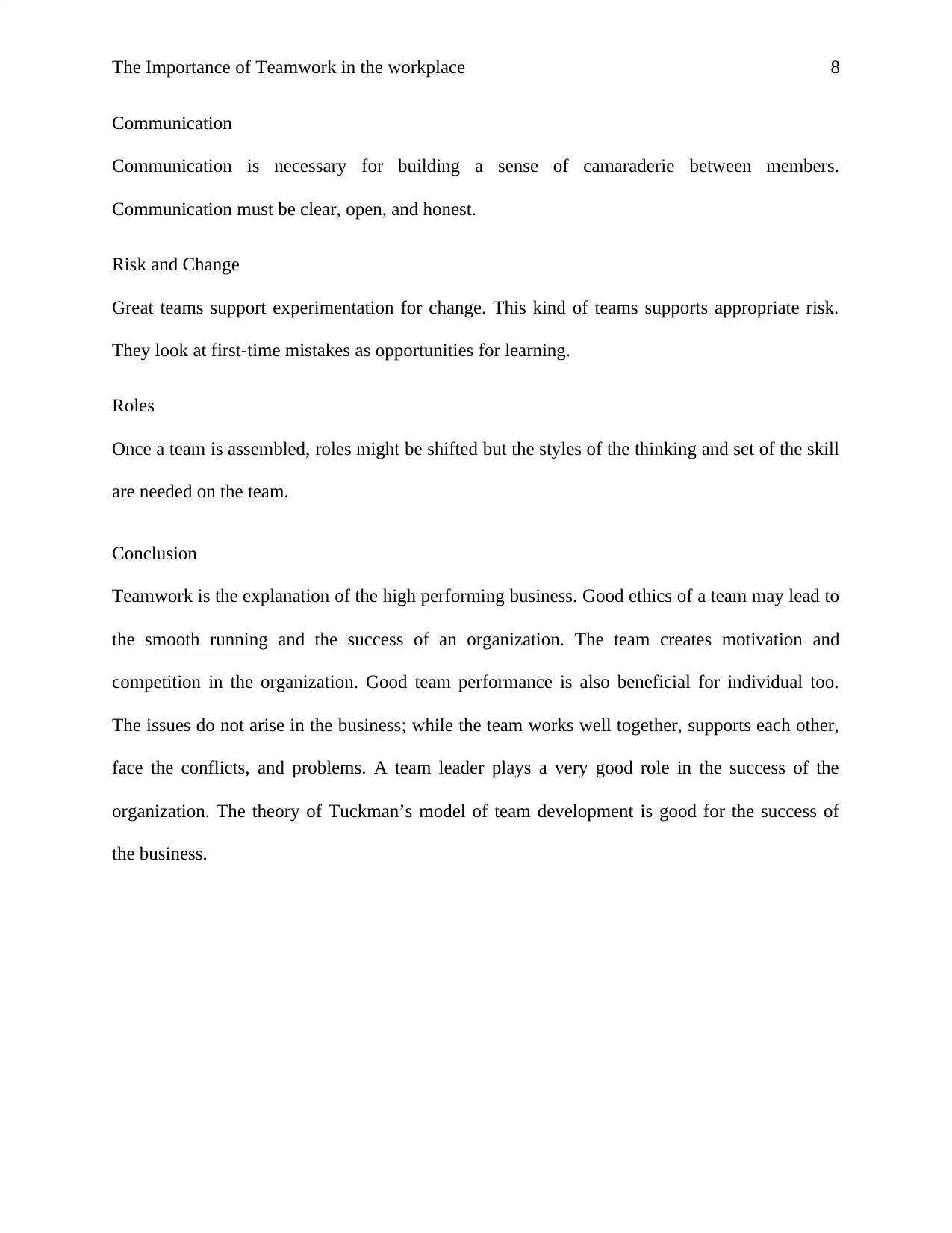
The Importance of Teamwork in the workplace 8
Communication
Communication is necessary for building a sense of camaraderie between members.
Communication must be clear, open, and honest.
Risk and Change
Great teams support experimentation for change. This kind of teams supports appropriate risk.
They look at first-time mistakes as opportunities for learning.
Roles
Once a team is assembled, roles might be shifted but the styles of the thinking and set of the skill
are needed on the team.
Conclusion
Teamwork is the explanation of the high performing business. Good ethics of a team may lead to
the smooth running and the success of an organization. The team creates motivation and
competition in the organization. Good team performance is also beneficial for individual too.
The issues do not arise in the business; while the team works well together, supports each other,
face the conflicts, and problems. A team leader plays a very good role in the success of the
organization. The theory of Tuckman’s model of team development is good for the success of
the business.
Communication
Communication is necessary for building a sense of camaraderie between members.
Communication must be clear, open, and honest.
Risk and Change
Great teams support experimentation for change. This kind of teams supports appropriate risk.
They look at first-time mistakes as opportunities for learning.
Roles
Once a team is assembled, roles might be shifted but the styles of the thinking and set of the skill
are needed on the team.
Conclusion
Teamwork is the explanation of the high performing business. Good ethics of a team may lead to
the smooth running and the success of an organization. The team creates motivation and
competition in the organization. Good team performance is also beneficial for individual too.
The issues do not arise in the business; while the team works well together, supports each other,
face the conflicts, and problems. A team leader plays a very good role in the success of the
organization. The theory of Tuckman’s model of team development is good for the success of
the business.
⊘ This is a preview!⊘
Do you want full access?
Subscribe today to unlock all pages.

Trusted by 1+ million students worldwide
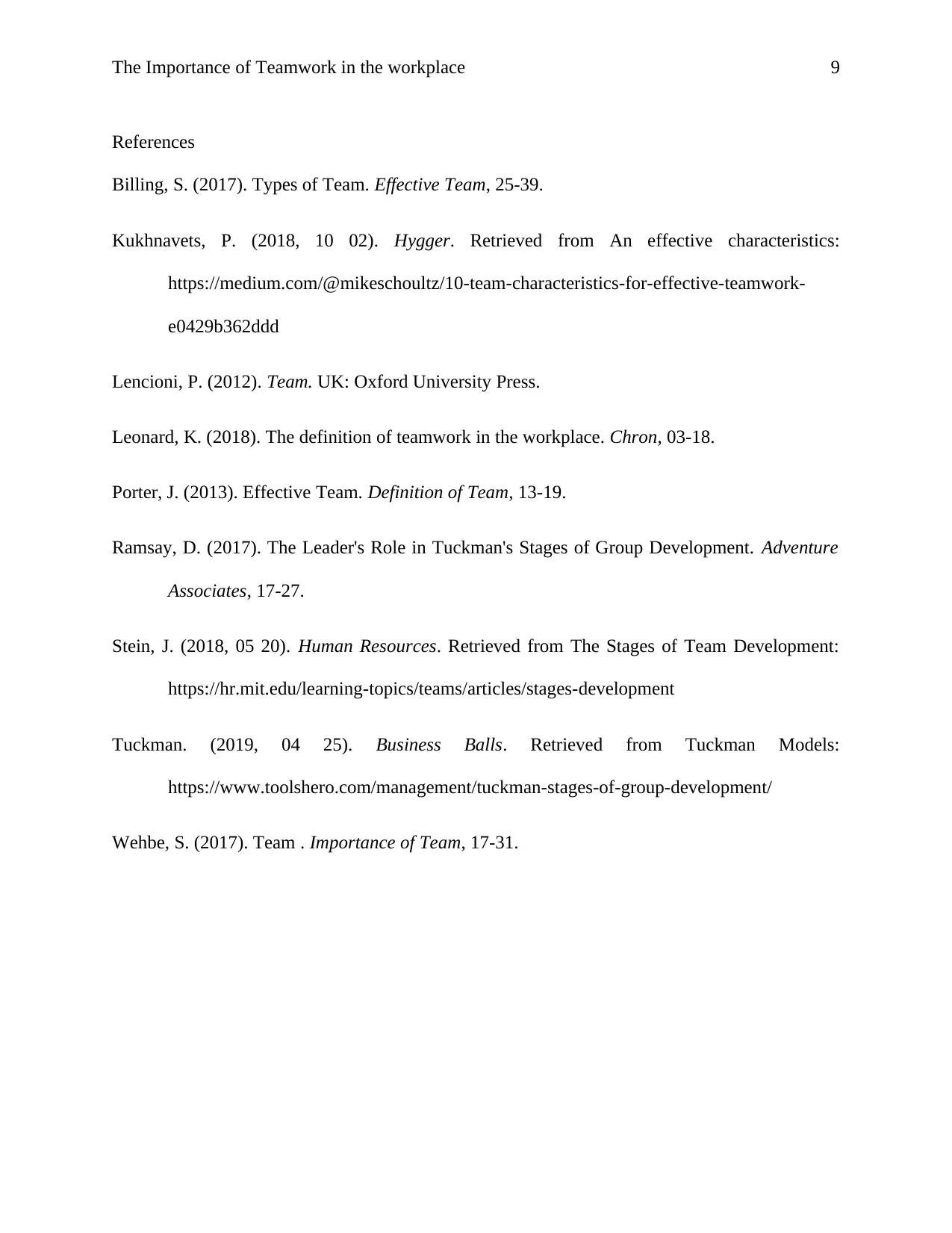
The Importance of Teamwork in the workplace 9
References
Billing, S. (2017). Types of Team. Effective Team, 25-39.
Kukhnavets, P. (2018, 10 02). Hygger. Retrieved from An effective characteristics:
https://medium.com/@mikeschoultz/10-team-characteristics-for-effective-teamwork-
e0429b362ddd
Lencioni, P. (2012). Team. UK: Oxford University Press.
Leonard, K. (2018). The definition of teamwork in the workplace. Chron, 03-18.
Porter, J. (2013). Effective Team. Definition of Team, 13-19.
Ramsay, D. (2017). The Leader's Role in Tuckman's Stages of Group Development. Adventure
Associates, 17-27.
Stein, J. (2018, 05 20). Human Resources. Retrieved from The Stages of Team Development:
https://hr.mit.edu/learning-topics/teams/articles/stages-development
Tuckman. (2019, 04 25). Business Balls. Retrieved from Tuckman Models:
https://www.toolshero.com/management/tuckman-stages-of-group-development/
Wehbe, S. (2017). Team . Importance of Team, 17-31.
References
Billing, S. (2017). Types of Team. Effective Team, 25-39.
Kukhnavets, P. (2018, 10 02). Hygger. Retrieved from An effective characteristics:
https://medium.com/@mikeschoultz/10-team-characteristics-for-effective-teamwork-
e0429b362ddd
Lencioni, P. (2012). Team. UK: Oxford University Press.
Leonard, K. (2018). The definition of teamwork in the workplace. Chron, 03-18.
Porter, J. (2013). Effective Team. Definition of Team, 13-19.
Ramsay, D. (2017). The Leader's Role in Tuckman's Stages of Group Development. Adventure
Associates, 17-27.
Stein, J. (2018, 05 20). Human Resources. Retrieved from The Stages of Team Development:
https://hr.mit.edu/learning-topics/teams/articles/stages-development
Tuckman. (2019, 04 25). Business Balls. Retrieved from Tuckman Models:
https://www.toolshero.com/management/tuckman-stages-of-group-development/
Wehbe, S. (2017). Team . Importance of Team, 17-31.
1 out of 10
Related Documents
Your All-in-One AI-Powered Toolkit for Academic Success.
+13062052269
info@desklib.com
Available 24*7 on WhatsApp / Email
![[object Object]](/_next/static/media/star-bottom.7253800d.svg)
Unlock your academic potential
Copyright © 2020–2026 A2Z Services. All Rights Reserved. Developed and managed by ZUCOL.





